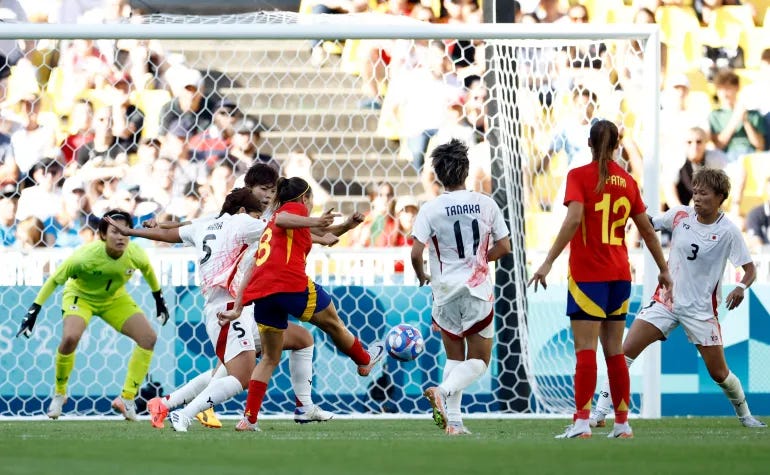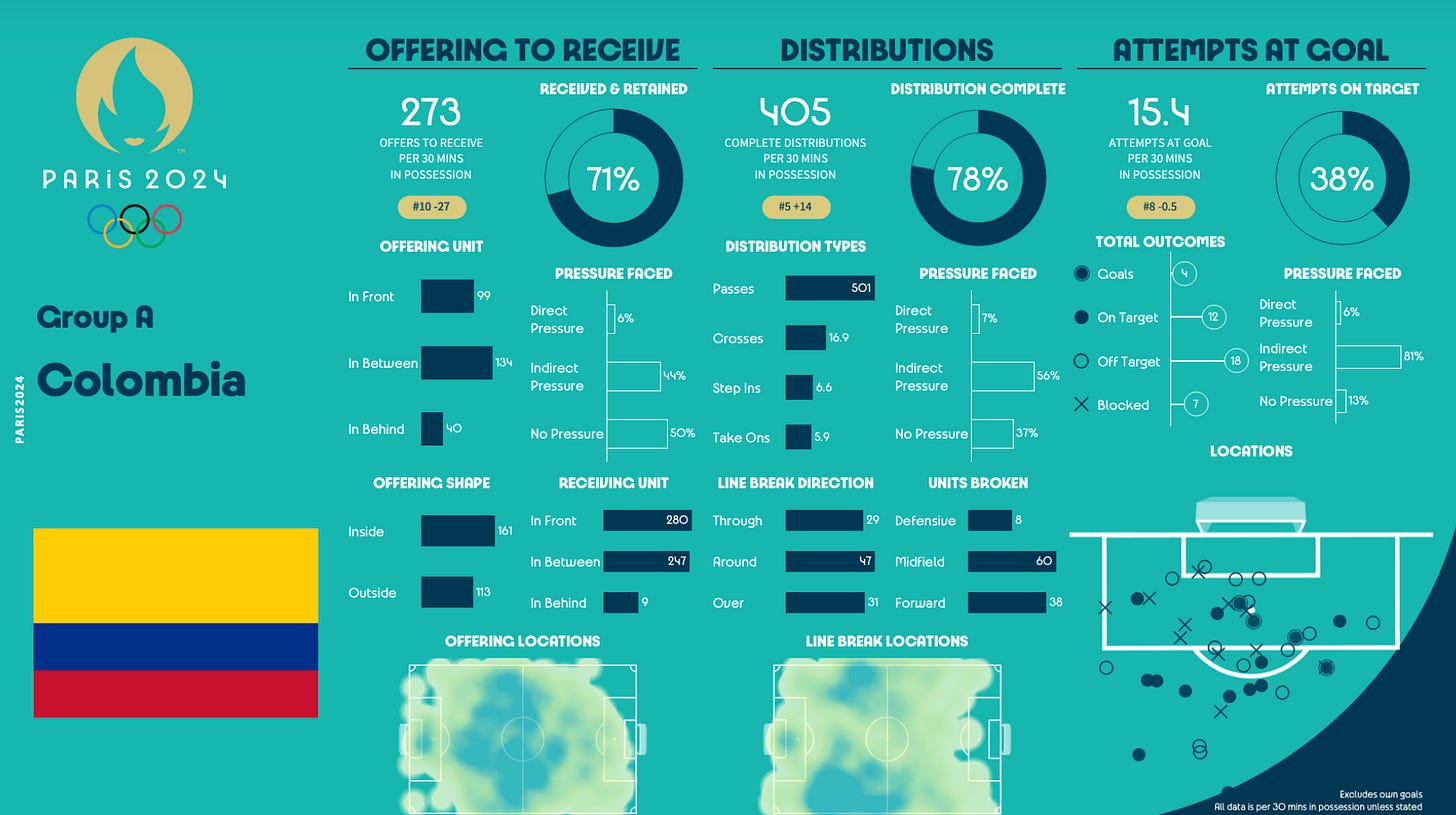Quarter-finalists secured following a dramatic Group stage phase.
Every team of the eight quarter-finalist showed some of their toolbox, so what did we learn? Here is a deep dive.
After 18 football matches in one week at the Olympic games, eight nations have booked their ticket to the quarter-final stages of the tournament.
Given the quick and congested schedule of the Olympics, the quarter-finalists can say they are halfway through the competition as the chance to play for a medal is only win away. There has been many take-way lessons that set expectations for the upcoming rounds in how the teams will do, here is a deep dive.
The United States
The USWNT was the first to secure their position in the next round after two dominant wins over Zambia and Germany, followed by a clean victory against the Matildas to make it three from three. The Americans’ new era under head coach Emma Hayes is off to a flying start and the proof is in the football displayed so far.
Coming into France, questions loomed surrounding the teams after goal-shy performances in the warm-up friendlies with worries extending from last years’ World Cup, under then head coach, Vlatko Andonovski.
The attacking firepower made up by Sophia Smith, Trinity Rodman and Mallory Swanson have answered some concerns with a statement. All three attackers sit in the top five of the tournament in average shots on goals, with Smith leading the trio at an avg. 4.3 shots per game. Collectively, they have scored seven, and when not hitting goals, they are providing them, as all three have achieved at-least an assist each.
In comparison to last summer, the USWNT recorded only four shots on target against The Netherlands in the group stages where the points were shared off a 1-1 result. Both Rodman and Smith were starters that evening with the exception of Alex Morgan in between.
Hayes’s urgent style of play when moving possession forward has brought out the best out the talented frontline, who not only have found opportunity to put their finishing qualities on display, but creative input as-well. The U.S. will have to deal without Sam Coffey against Japan in the QF due to accumulation of yellow cards.
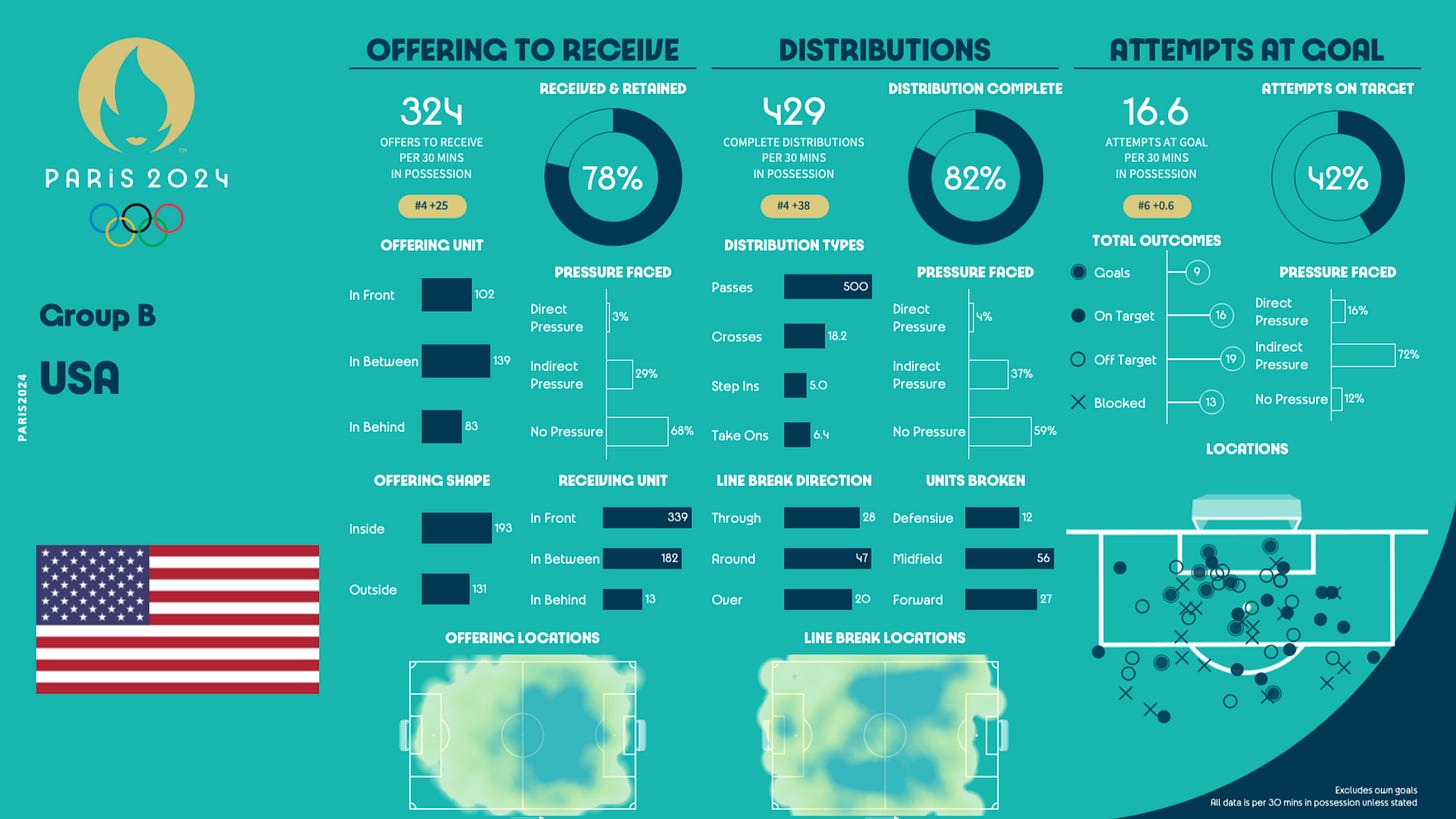
The an unrotated starting XI against Australia on Wednesday brews questions as to why Sam Coffey started given she was one yellow card away from a suspension, and qualification was already secured. This coupled with Tierna Davidson injury concerns might push Emily Sonnett to slot into centre-back again on Saturday. Recent substitution patterns suggest, Korbin Albert could be given the nod, too. Not to mention, the unrested players will have to up the amount of rest in prevention of tiring out.
Spain
Spain may be the only team debuting this Olympic games, but it does not look like their first run-do at a tough congested tournament schedule. The World Champions topped their group winning all three possible games and will now face Colombia.
The Spaniards had to overcome three completely different opponents in Nigeria, Japan and Brazil, each presenting their own problems. Having recorded 20 shots against the Super Falcons and dominated just over 70% possession, it was a brilliant Alexia Putellas freekick that made the difference in the final minutes of the game.
In the opener, it was Japan who opened the scoring first and made Spain work from behind. Dominating possession like expected, they did not look overly clinically up top, but moving the ball so well and providing many different looks up top, the goals rolled in.
The reigning world champions have learnt to stay calm, continue poking at backlines, and the trust that the break-though will eventually come. Wether that is through a moment of brilliance like recently seen, or opposition backlines unable to defend all 90 minutes, Spain have not rushed to hit the panic button.
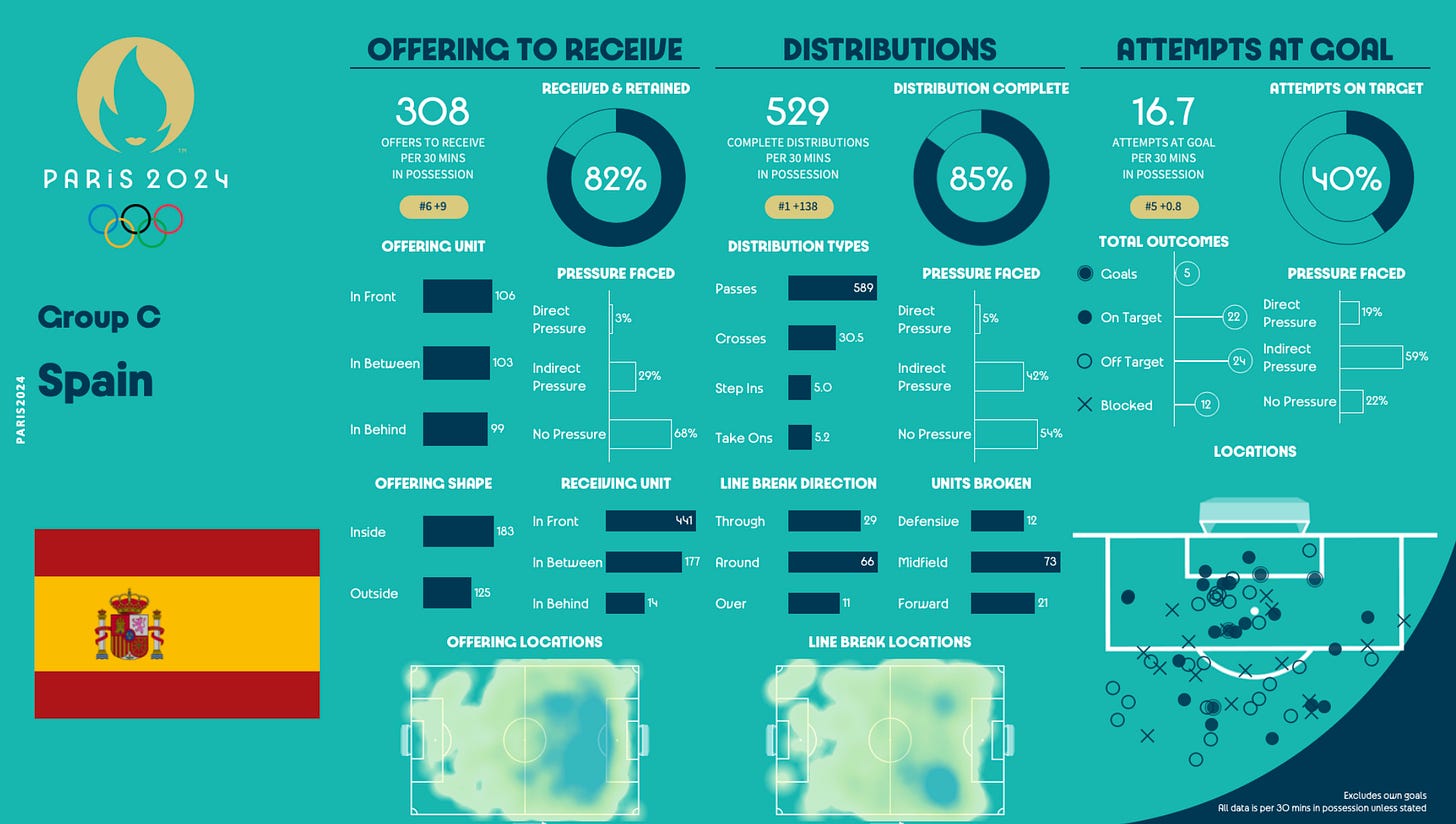
All 18 players are on the same page to keep going, keep moving the ball, and keep passing fluidly and intelligently. It was quick passing that led to goals versus Brazil and Japan. Spain trust in how they are able to move the ball, and it is a step ahead any other team in tournament. This has helped Spain maintain nerves when the are behind, but also not become reckless when the whistle is about to blow and they have not scored yet.
France
The host nation topped their group with two wins, and a loss to the reigning Olympic champions in Group A, booking their ticket to face Brazil. Yet, even with the home crowd and on home soil, they have not looked utterly convincing.
Les Blues struggled to keep a clean sheet in any of the group stage fixtures, conceding five across the three games, four of which coming in the second half. Injuries to captain Wendie Renard and Élisa De Almeida in the backline have forced rotations, hindering momentum and producing an inconsistent French defensive unit.
Additionally, France’s goalkeeper department is lacking a standout talent. Number one option Pauline Peyraud-Magnin has become error prone in the last two years, unable to guarantee shutouts for her side. Back-up ‘keeper Constance Picaud picked up her 8th senior cap as a substitute against Canada in the second game of the tournament, conceding Canada’s winner.
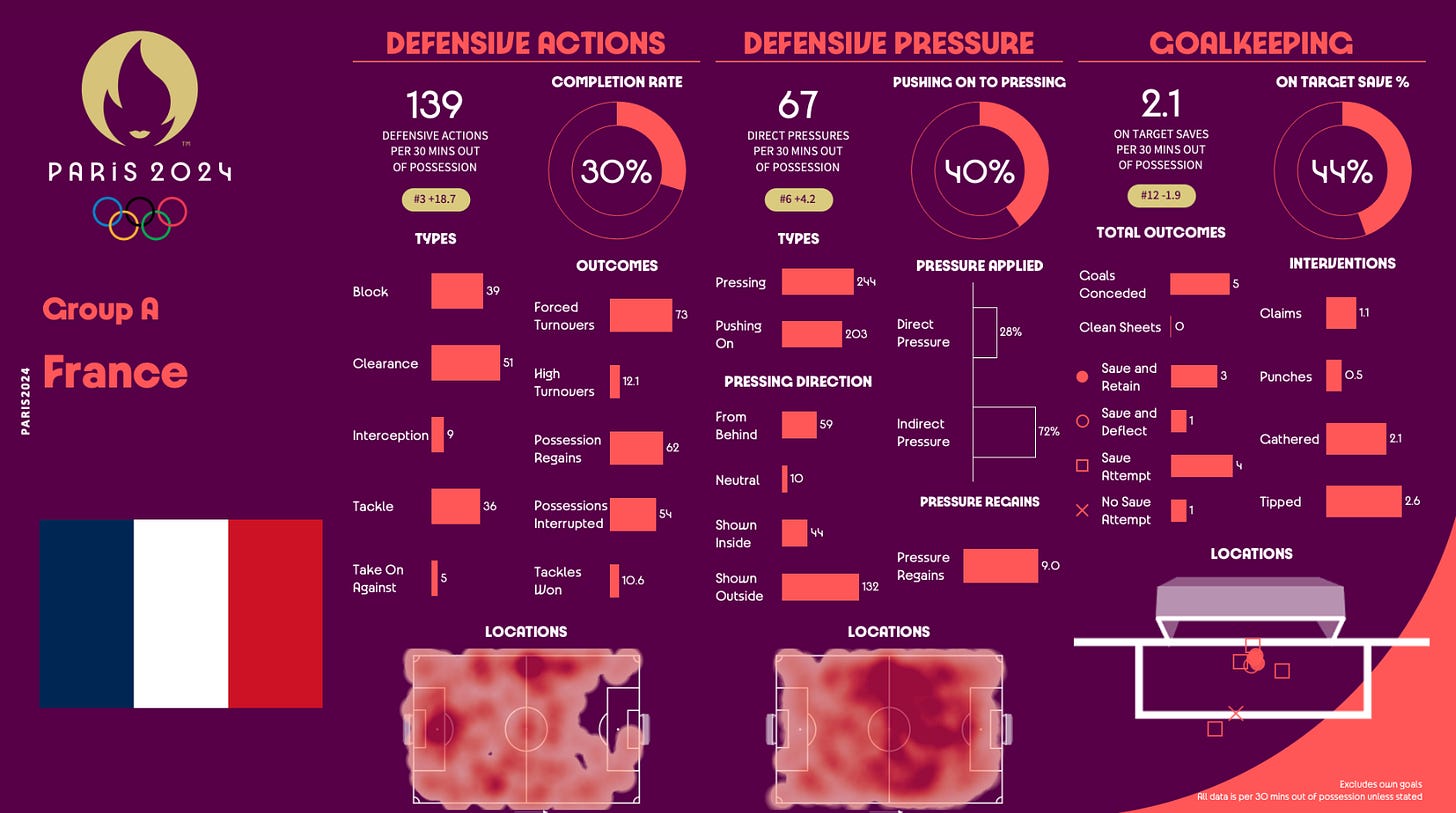
What has made up for defensive errors, is the dominance up top with the return of Marie-Antoinette Katoto who currently leads the golden boot race with five goals. The French forward sustained an ACL injury one game into Euro 2022, sidelining her for over a year missing the 2023 World Cup.
As the saying goes this Olympics, when Katoto shoots, Katoto scores. Finding the net for five of the seven shots taken on goal, is why backline try to close in on Katoto as fast and as soon as possible.
Japan
Japan have not looked as smooth as the Japan from last summer, yet have impressed with the bank of ideas they have pulled from, making them too tricky to knock out. Since being in the role, head coach Futoshi Ikeda has enjoyed rotating his starting XI and tailoring it depending on opposition, and in some ways, having that skill has played greatly to his benefit this Olympics.
Three different Japan line-ups pushed opponents to spend more time adjusting, who eventually could not crack into answers on how to completely shut down Japan. Heading into their second game against Brazil, injuries mounted with Risa Shimizu pulling out and Aoba Fujino unavailable for selection. In their finale game against Nigeria, Japan took a front foot approach which awarded them with 10 shots on goal.
The new alternate rule allowed for names to be called in, and the challenge of big injuries early have showcased the depth Japan have across the 22 players. All of Japan’s five goals were scored by a different player, the most out of any of the advancing squads. They have scored from, a direct freekick, the spot, off the counter, and from building from the back thus far.
Yui Hasegawa has been a key operator in the midfield in starting all three games. The Manchester City midfielder has acted as the glue between clearing the ball form behind, to providing the slicing passes up front.
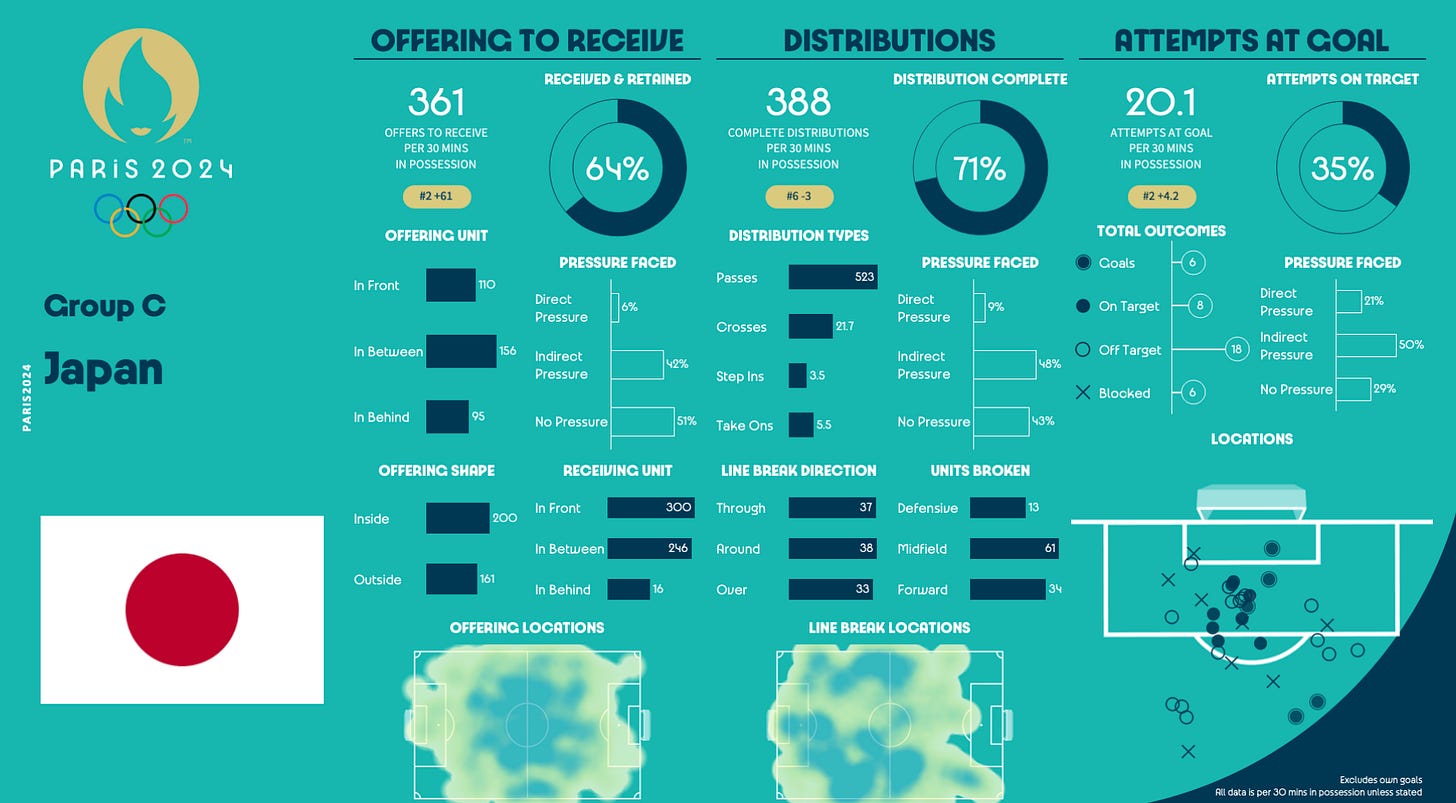
Equally, Ikeda’s roll out of a 3-4-3 or 5-3-2 sees great numbers defending, which made it hard for both Nigeria and Brazil to puncture Japan’s backline with ease. A quick sequence of plays by the Spanish was too hard to defend, handing the Japanese a loss in the opening game. Japan and the USWNT fixture in the quarter-finals will be a chess match, with two completely schools of football battle-ing it out.
Brazil
The South American nation was one of the two teams to proceed after finishing third in their group, upping Australia with a single goal on the GD. To say it was tight is an understatement.
The 18 player squad has seen lots of changes in comparison to last summer at the World Cup. A new look squad missing the likes of Debinha, Bia Zaneratto, Andressa Alves and Geyse, as well as working with a new head coach, the transition aches were clear this group stage.
There has been an emphasis on adding young players in the squad, versatile players able to play in multiple positions, and keeping important veterans like the legendary Marta, and former Arsenal defender Rafaelle Souza at the centre of things.
As a result, the depth of players Brazil almost got them the win over Japan, but almost, is not enough. Ana Vitoria, Priscila, and Angelina were standout players that loss, and will have made a case to play good minutes against France in the QF.
After dropping all three points against the Japanese, it became an uphill task of having to beat Spain next. Going down to 10 players after Marta was handed a straight red, made the task even harder. The Brazilian icon will now miss the QF fixture, meaning she could have just played her last international game.
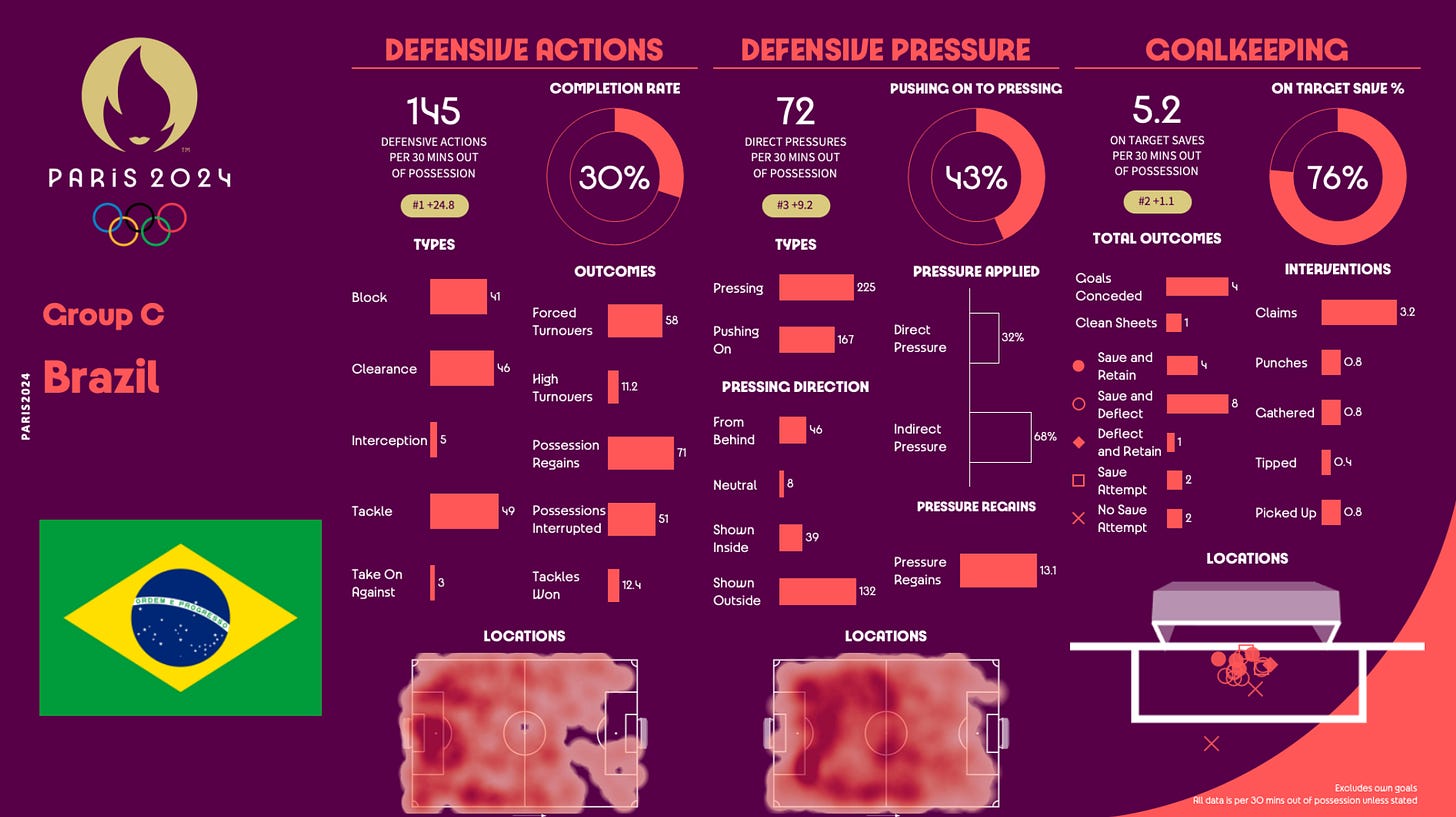
Antônia Silva went down with injury in the final minutes versus Spain, with reports confirming she suffered a fractured fibula. The key defender started all games so far and has been a key player in keeping flank pressure away. Silva’s partnership with Souza has been strong, and fun to watch. It will be interesting to see how Brazil adjusts to the losses and injuries pilling up. The Olympic schedule does not make it much easier either.
Colombia
Loosing two games and having an underwhelming win over New Zealand, Colombia have done just enough to go through as the second nation finishing third in their group standing.
Las Chicas had an almost miraculous comeback against the hosts in their opening game, scoring two goals in the second half after going 3-0 down. A red card to Mayra Ramírez slowed down momentum and took out Colombia’s biggest threats up front. Ramírez’s suspension ran for the next two game, but she will back available in the quarterfinals.
Current head coach Ángelo Marsiglia was one of the assistant coaches last summer, and that managerial change is apparent. Needing just a draw against Canada draw to finish second in the group, it was odd to see no desire in finding the net for a consistent run of plays. The final 10 minuted, including added time, Colombia pushed on, but it was a little too late by then. Often, the team stood still with not much care to keep the ball tightly. Colombia lost possession too easily causing careless turnover that ended in the favour of Canada.
Linda Caicedo has been a bright light in creating chances for her teammates, unable to find the devastating finisher off her service. Equally, opposition, and very clearly Canada, make it a priority to close down Caicedo. If anything, Spain are very familiar with the Real Madrid winger and know her tendencies very well.
Germany
Loosing Lena Oberdorf a week away from the Olympics kick off was far from ideal for Germany. Yet, they have done well in what was a tricky group. Sticking with a 4-4-2 to make up for the loss of Oberdorf and enforce attacking talent, Germany placed second in the standing.
The Europeans opened their campaign with a convincing 3-0 win over an un-inspiring Australian side. Off the corner delivery, it was Giulia Gwinn’s superb crosses that assist two of the three goals. Too worried defending Alex Popp, Lea Schüller was ignored by the Australian players, a bad mistake, and she scored both.
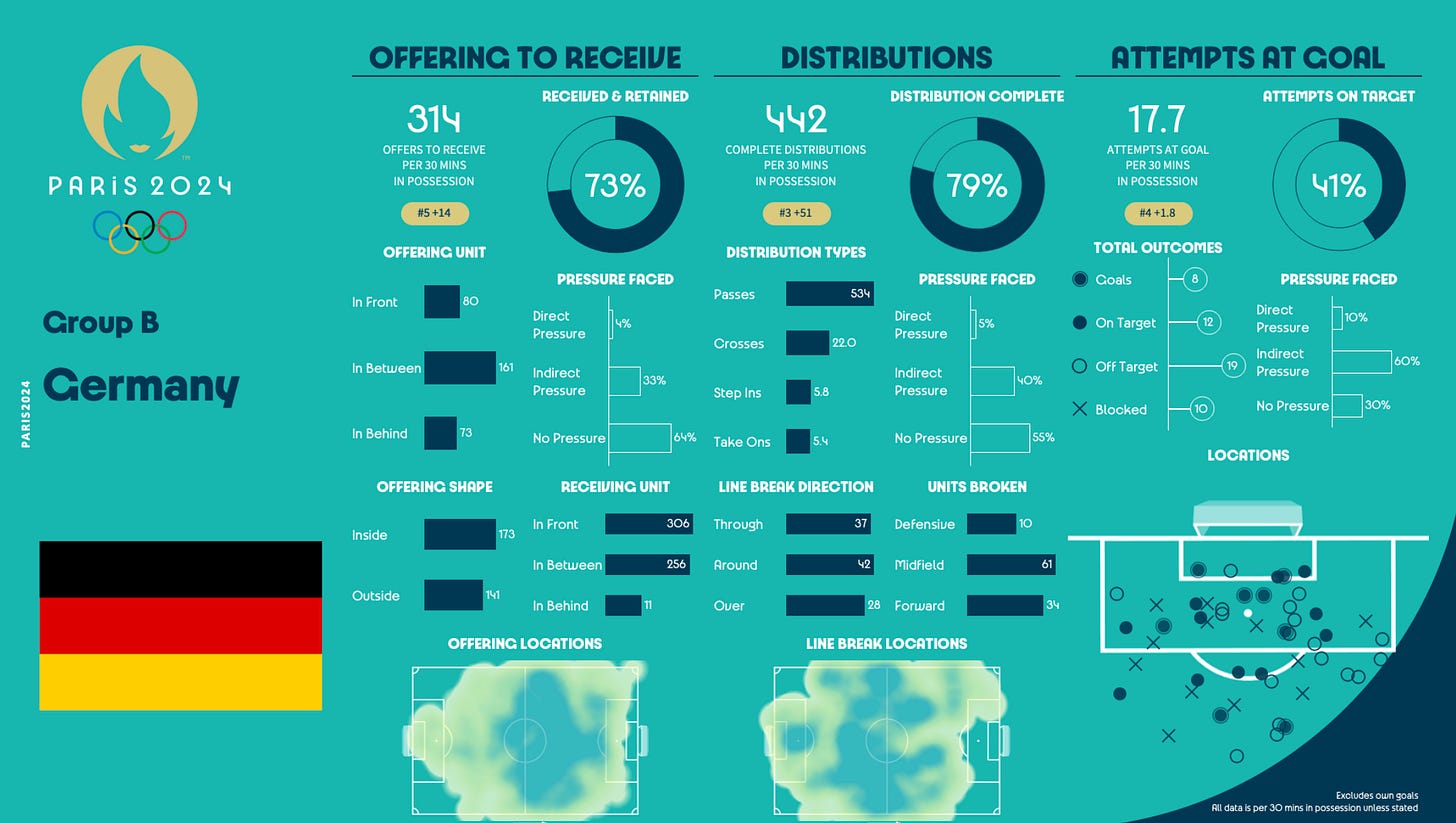
Shüller in particular has now eight goal contributions in Germany’s last seven games. The Bayern forward has looked sharp in finishing, and smart in her runs between pocket. Impressive up front have been Jule Brand and Klara Bühl. Germany’s set of attackers should frighten any team.
Germany fell short against the Americans in a 3-1 defeat, and the forced defensive changes were a contributor. The Germans lost Sarai Linder after the opening game, Marina Hegering in the warm-up, and then her defensive partner Kathrin Hendrich just 20 minutes into the game.
Canada
The Canadians have sure dominated the headlines this Olympics, and probably not in the best light. Despite a six-point deduction by FIFA following coaching staff cheating with a drone over New Zealand’s training camp, the team won all three games and placed second in their group.
There will be questions asked regarding the allegations, 12 ongoing investigations and imposed sanctions, but there is little to question about the grit and resilience the group showed in the two must win games. A shrunk down coaching staff, and dealing with the betrayal of a coach, it has not been an easy week for the 22 players in camp.
Canada were the better team when it mattered most against France, who let their 1-0 lead slip. Les Rouge pushed the pace in the second half, kept Diani and Katoto quiet for the majority of the game, and took their chances at an inexperienced goal keeper.
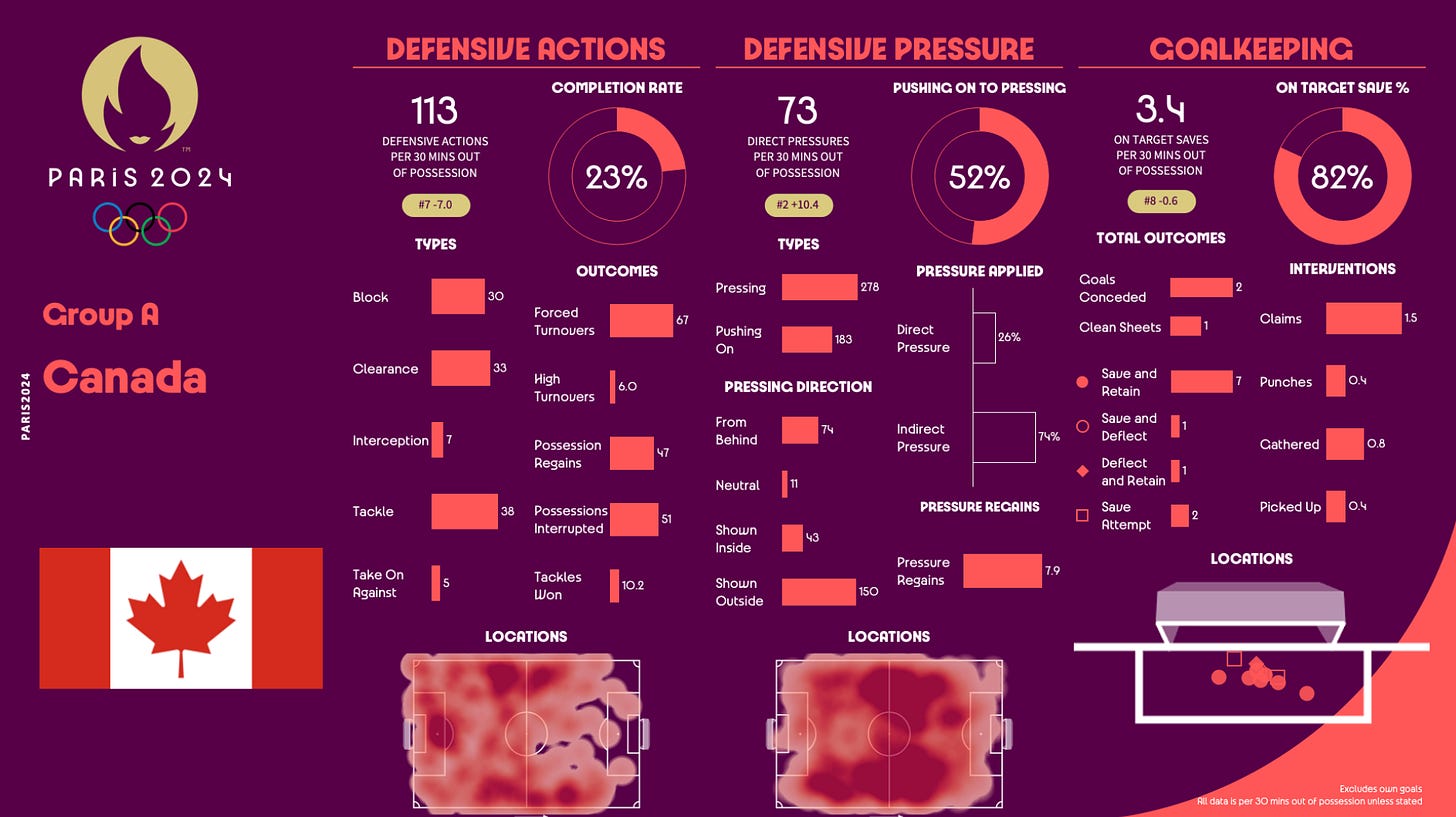
Jade Rose, has been a monumental talent for the Canadians so far. Dealing with Jayde Riviere’s injury, Rose has played all 270 minutes at a high level. Tasked with defending the likes of Caicedo and the French runner, Rose played a like a veteran.
Canada have approached all three games differently. That could be a result to the forced coaching staff change which has placed Andy Spence as the leader, or tactical versatility based on opposition. Through it all, there has been speed and high press action from the set of forwards, and a Vanessa Gilles coming in clutch with two winning goals.


